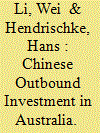|
|
|
Sort Order |
|
|
|
Items / Page
|
|
|
|
|
|
|
| Srl | Item |
| 1 |
ID:
175563


|
|
|
|
|
| Summary/Abstract |
This article contributes to our understanding of Chinese corporate expansion into developed economies by using Australia as a case study of how, in the 2010s, Chinese firms began transiting from government-driven resource investment to entrepreneurial expansion in new industries and markets. We contextualize this process by demonstrating how changing market demand and institutional evolutions at home and in the host country created new motivations for Chinese investors. In particular, the decline of active government control in China over the overseas operations of Chinese firms and the more business-oriented regulatory regime in Australia empowered local subsidiaries of Chinese firms to become more entrepreneurial and explorative in their attempts to compensate for their lack of competitiveness and weak organizational capabilities. Consequently, Chinese firms brought their domestic experience and modus operandi to the Australian host market and collectively adapted and deployed dynamic capabilities such as the use of network linkages, experiential learning and corporate reconfiguration. We find that this transfer of capabilities was facilitated by the co-evolution of the Chinese and Australian institutional and market environments and has maintained Australia's position as one of the major recipient countries of Chinese outbound investment, opening the Australian economy to ongoing expansion and disruption.
|
|
|
|
|
|
|
|
|
|
|
|
|
|
|
|
| 2 |
ID:
151977


|
|
|
|
|
| Summary/Abstract |
The article examined the nature, dynamics and implications of the interactions of interventions and project contexts. It emphasised the centrality of the resources of interventions in driving the mutual, bi-directional impacts of both interventions and project context. Using a grounded theory (GT) research approach, the study investigated the interactions of the Niger Delta Development Commission’s (NDDC) interventions in Odi community in Bayelsa State, Nigeria. A peace and conflict impact theory that emerged offers eight concepts: resource-status of intervention, black hole of interactions (Bhis), likely deprivation, malevolent charity–beggar relationship, oppressiveness and divisiveness of intervention, local capacities for peace (LCP) and federal government presence as a theoretical explanation of the phenomena. It argues that the resource-status the interventions enjoy compels competition from actors at various levels, in a socio-political and cultural space characterised by bad governance and endemic corruption. The competition begins with shady deals among influential actors as they appropriate the resources, constituting Bhis. The combined effects of the resource-status of intervention, Bhis and bad governance and endemic corruption provide sufficient conditions for spirals of negative impacts—likely deprivation, the malevolent charity–beggar relationship, oppressiveness and divisiveness of intervention—down the intervention programming stages. Thus, the potential positive impacts of the interventions are significantly reduced. However, the LCP and federal government presence that the interventions represent cushion the effect of the negative impacts.
|
|
|
|
|
|
|
|
|
|
|
|
|
|
|
|
|
|
|
|
|